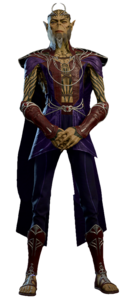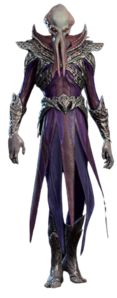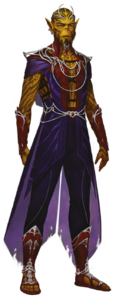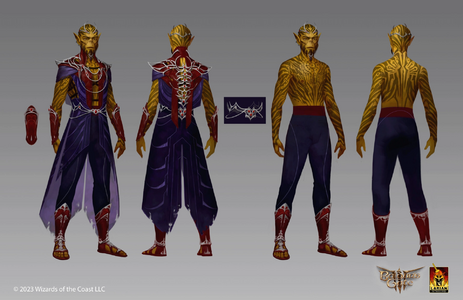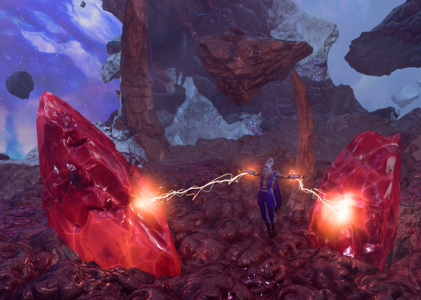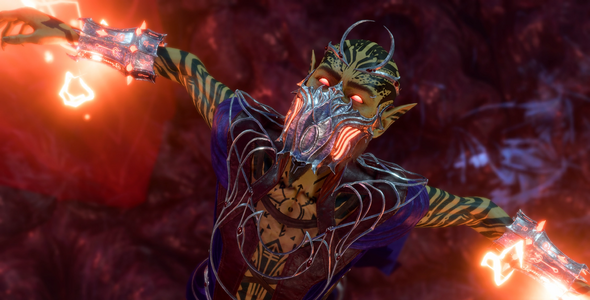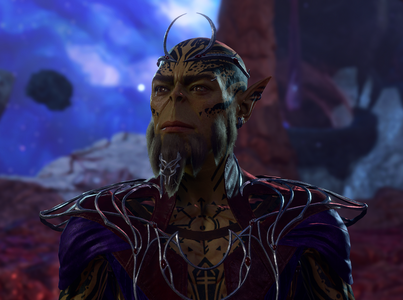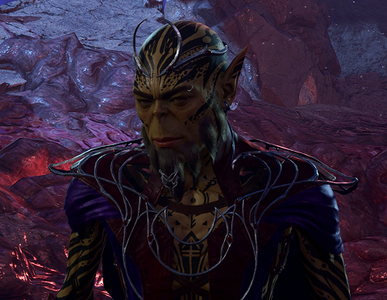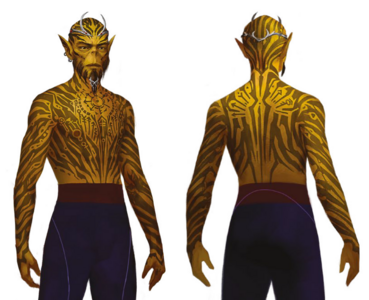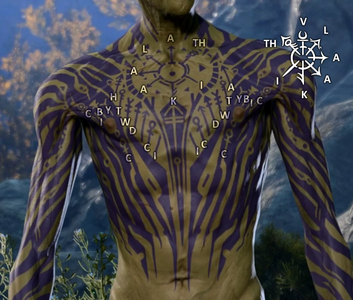Ad placeholder
Orpheus: Difference between revisions
No edit summary |
|||
| Line 37: | Line 37: | ||
== Involvement == | == Involvement == | ||
=== Act Three === | === Act Three === | ||
{{Spoiler warning|act=3}} | |||
Orpheus' | ==== Battle in the Astral Prism ==== | ||
Orpheus and his role in the greater story of ''Baldur's Gate 3'' is hinted at throughout the game, but is not truly revealed until the beginning of [[Act Three]] and the quest {{Quest|Help Your Protector}}. While resting at [[Wyrm's Lookout]], the party will be ambushed by githyanki warriors and combat will ensue. The [[Dream Guardian]] will open a portal into the [[Mysterious Artefact|Astral Prism]] and call the party into it, lest they fall under the [[Absolute]]'s influence. There, the Dream Guardian reveals their true form as a mind flayer free from hivemind control, and asks the party for their aid against the githyanki. Though the party has the option to attack their protector, this will lead to a [[Game Over screens|Game Over]], as the player either falls under the control of the Absolute, or are killed by the githyanki. After the battle, the Dream Guardian reveals that the source of the party's protection has been an imprisoned Orpheus, and that the githyanki who attacked are his Honor Guard, who were imprisoned alongside him by the first Vlaakith. Completing this encounter will complete both {{Quest|Discover the History of Prince Orpheus}} and {{Quest|Discover the Artefact's Secrets}}, as well as start {{Quest|Free Orpheus}}. | |||
==== Acquiring the Orphic Hammer ==== | |||
After his visit to the party's camp in [[Act Two]], Kith'rak Voss will have directed the party to meet him at [[Sharess' Caress]] in [[Wyrm's Crossing]]. Upstairs, in the [[Devil's Den]], the party will find him attempting to make a deal with the devil {{CharLink|Raphael}}, who eventually dismisses him. Talking to the devil reveals he has the {{SmRarityItem|Orphic Hammer}}, a magically imbued hammer with the ability to free Orpheus from his infernal chains. He promises to give the artifact to the party in exchange for the [[Crown of Karsus]], signing a {{SmRarityItem|Soul-Sworn Contract|override_icon=Soul-Sworn Contract.png}} with the player if they accept. The player has a few options: | |||
# {{Quest|Deal with the Devil}}: The player refuses the deal but decides to acquire the Orphic Hammer anyways. They infiltrate the [[House of Hope]] to steal the Orphic Hammer. This leads to a confrontation with Raphael, who the party must defeat. | |||
# {{Quest|Fulfill the Deal}}: The player accepts the deal and doesn't betray Raphael. At the final battle, after the party chooses to free Orpheus, Raphael will appear and hand them the Orphic Hammer. As his deal involves handing over the Crown of Karsus, this prevents {{CharLink|Gale}} from either giving the crown to {{CharLink|Mystra}} or using it to become a god, and causes Raphael to appear at the party in the [[Epilogue]]. | |||
# {{Quest|Escape the Deal}}: The player accepts the deal but ultimately decides to break it. Just like if they refused the deal, they must infiltrate the House of Hope and must acquire their contract, with the option of also stealing the Orphic Hammer. This leads to a confrontation with Raphael, who the party must defeat. | |||
Showing the Orphic Hammer to Voss will complete {{Quest|Help Kith'rak Voss}}, which gifts you the {{SmRarityItem|Silver Sword of the Astral Plane}} | |||
==== Deciding the Prince's Fate ==== | |||
At the [[Morphic Pool]], the player attempts to wield the Netherstones and control the Netherbrain, but are overwhelmed. The Emperor brings them into the Astral Prism, and tells them that only an illithid can successfully wield the Netherstones. It is here that Orpheus' fate can be decided, with most decisions contingent on whether or not the party acquired the Orphic Hammer. | |||
===== The Prince Assimilated ===== | |||
Orpheus can be "assimilated" by either the Emperor, a mind flayer player character, or a mind flayer {{CharLink|Karlach}}. If Lae'zel has rejected Vlaakith and embraced Orpheus, the player must pass a {{Ability check|Persuasion|30}} or she will turn hostile. Upon leaving the Astral Prism and reaching [[The High Hall|High Hall]], an enraged Voss will turn hostile unless convinced not to, which requires a {{Ability check|Persuasion, Deception|30}}, with an additional prerequisite {{Ability check|Persuasion, Intimidation|25}} if the player was the one to "assimilate" Orpheus. If Voss turns hostile, he can no longer be recruited as part of {{Quest|Gather Your Allies}} | |||
===== The Prince Freed ===== | |||
The player can refuse to allow the Emperor to "assimilate" Orpheus. Alternatively, a mind flayer player character can refuse to "assimilate" Orpheus, though a check is required to prevent your hunger from getting the best of you. Either choice causes the Emperor to defect to the Netherbrain, and the player can then free Orpheus. If the player made the deal with Raphael and didn't betray him, then he will show up and give the Orphic Hammer to the player. | |||
If the player still doesn't have the Orphic Hammer at this point, then Raphael will appear and make his offer again. Refusing the offer causes a Game Over, so the player is forced to {{Quest|Fulfill the Deal}}. | |||
Regardless, Orpheus is freed and offers an alliance to the player. Like the Emperor, he tells the player that the only way to wield the Netherstones is to become an illithid. There are several options open to the player at this point: | |||
# The player or another party member becomes a mind flayer. Orpheus lowers his psionic defenses to allow the order to transform to go through. | |||
# If the player and any other party members refuse to become a mind flayer, Orpheus offers to make the sacrifice instead. Lae'zel is dismayed but will not turn hostile. | |||
# The player and the party decide to fight Orpheus. Winning or losing this battle immediately results in a Game Over, as the party either dies or loses Orpheus' protection and becomes dominated by the Absolute. | |||
Regardless of who transforms, Orpheus will join the player's party as a temporary companion for the final battle. Depending on who transformed, Voss will express either confusion or dismay, but will also not turn hostile. | |||
=== '''Endings''' === | |||
{{Content warning|section|described|selfharm}} | |||
Orpheus' role in the ending will depend on whether or not he transformed into a mind flayer | |||
If Orpheus turned into a mind flayer, he will appear on the docks and ask Lae'zel to lead the githyanki fight for freedom without him, as he is now an abomination and seeks death. He will ask another party member (usually the player or Lae'zel) to kill him. If no player fulfills his request, he will kill himself unless the player convinces him not to with a {{Ability check|Persuasion|20}}. If the player passes the check, he will leave the docks for places unknown. | |||
If the player or another party member turned into a mind flayer, he will appear on the docks, thanking the party's ceremorph for their sacrifice and ready to begin a new rebellion against Vlaakith's tyranny. He will call two red dragons, and invite Lae'zel to join him in his new war against the Lich Queen. Lae'zel can either join Orpheus, be convinced to stay in Faerun (which requires a {{Ability check|Persuasion|30}}, and will automatically be rejected if the player became a mind flayer), or take the player along with them (if the player is romancing Lae'zel). Regardless of what choice Lae'zel makes, Orpheus flies on his red dragon into the sky and away from Baldur's Gate. | |||
=== Epilogue === | |||
{{Content warning|section|mentioned|selfharm}} | |||
If Orpheus did not transform into a mind flayer, then the player will find a letter from him in the {{SmRarityItem|Chest of Grateful Words}}, titled {{SmRarityItem|The First Protocol}}. In it, he praises the player as ''Mla'ghir'' ([[Githyanki vocabulary|Gith]] for "liberator"), and tells them of the success of his ongoing rebellion against Vlaakith. | |||
If Orpheus transformed into a mind flayer but was convinced not to kill himself, then a unique dialogue option asking about him will be present when talking to Lae'zel. Her response indicates that Orpheus has likely gone into hiding, but that she holds out hope he might re-emerge one day. | |||
== Combat == | == Combat == | ||
| Line 65: | Line 100: | ||
* {{MdRarityItem|Orpheus, Prince of the Comet, Part Three: Resurrection}} | * {{MdRarityItem|Orpheus, Prince of the Comet, Part Three: Resurrection}} | ||
* {{MdRarityItem|Report for Raphael}} | * {{MdRarityItem|Report for Raphael}} | ||
* {{MdRarityItem|The First Protocol}} | |||
==Gallery== | ==Gallery== | ||
Revision as of 03:09, 18 September 2024
| Overview | Combat |
Orpheus, is a Githyanki that appears in Baldur's Gate 3, playing a major role in Act Three and Lae'zel's personal quest, . He acts as the supposed true ruler of the Githyanki. However, he has been captured and is imprisoned in the Astral Plane. Being a Githyanki, he seeks to destroy the Mind Flayers and remove Vlaakith from power.

“Quickly now - even here, we do not have infinite time.„
Overview
Background
According to the inscribed discs, banned by followers of Vlaakith and labelled as heretical, Orpheus is the first, and only, son of Mother Gith, the leader of the rebellion that freed the race that would then bear her name, from the Mind Flayer Empire. Sometime after the beginning of their freedom, the collective Gith race split into two cultures; the Githyanki and the Githzerai, the former, Orpheus was a part of.
Upon discovering that Vlaakith I (Not to be confused with Vlaakith CLVII) had betrayed his mother, sacrificing her to create a pact with ![]() Tiamat, Orpheus led Gith's Honour Guard in a revolt and named himself the rightful king of the Githyanki, triggering the War of the Comet. At the head of the Honour Guard mounted on red dragons, Orpheus bravely fought Vlaakith's knights in a battle in the Astral Plane, where he praised Mother Gith and accused Vlaakith. Yet he was overcome and defeated in battle against Kith'rak Voss, and was thought dead.
Tiamat, Orpheus led Gith's Honour Guard in a revolt and named himself the rightful king of the Githyanki, triggering the War of the Comet. At the head of the Honour Guard mounted on red dragons, Orpheus bravely fought Vlaakith's knights in a battle in the Astral Plane, where he praised Mother Gith and accused Vlaakith. Yet he was overcome and defeated in battle against Kith'rak Voss, and was thought dead.
Unknown to all but Vlaakith and Voss; however, Orpheus was instead imprisoned within the Astral Prism, so that Vlaakith may exploit the powers he inherited from his mother.
At some time before the events of Baldur's Gate 3, The Emperor had discovered the Astral Prism, who proceeded to use it to rebel against the Elder Brain.
Involvement
Act Three
Spoiler warning: The following content contains unhidden spoilers for Act 3. |
Battle in the Astral Prism
Orpheus and his role in the greater story of Baldur's Gate 3 is hinted at throughout the game, but is not truly revealed until the beginning of Act Three and the quest . While resting at Wyrm's Lookout, the party will be ambushed by githyanki warriors and combat will ensue. The Dream Guardian will open a portal into the Astral Prism and call the party into it, lest they fall under the Absolute's influence. There, the Dream Guardian reveals their true form as a mind flayer free from hivemind control, and asks the party for their aid against the githyanki. Though the party has the option to attack their protector, this will lead to a Game Over, as the player either falls under the control of the Absolute, or are killed by the githyanki. After the battle, the Dream Guardian reveals that the source of the party's protection has been an imprisoned Orpheus, and that the githyanki who attacked are his Honor Guard, who were imprisoned alongside him by the first Vlaakith. Completing this encounter will complete both and , as well as start .
Acquiring the Orphic Hammer
After his visit to the party's camp in Act Two, Kith'rak Voss will have directed the party to meet him at Sharess' Caress in Wyrm's Crossing. Upstairs, in the Devil's Den, the party will find him attempting to make a deal with the devil Raphael, who eventually dismisses him. Talking to the devil reveals he has the ![]() Orphic Hammer, a magically imbued hammer with the ability to free Orpheus from his infernal chains. He promises to give the artifact to the party in exchange for the Crown of Karsus, signing a
Orphic Hammer, a magically imbued hammer with the ability to free Orpheus from his infernal chains. He promises to give the artifact to the party in exchange for the Crown of Karsus, signing a ![]() Soul-Sworn Contract with the player if they accept. The player has a few options:
Soul-Sworn Contract with the player if they accept. The player has a few options:
- : The player refuses the deal but decides to acquire the Orphic Hammer anyways. They infiltrate the House of Hope to steal the Orphic Hammer. This leads to a confrontation with Raphael, who the party must defeat.
- : The player accepts the deal and doesn't betray Raphael. At the final battle, after the party chooses to free Orpheus, Raphael will appear and hand them the Orphic Hammer. As his deal involves handing over the Crown of Karsus, this prevents Gale from either giving the crown to Mystra or using it to become a god, and causes Raphael to appear at the party in the Epilogue.
- : The player accepts the deal but ultimately decides to break it. Just like if they refused the deal, they must infiltrate the House of Hope and must acquire their contract, with the option of also stealing the Orphic Hammer. This leads to a confrontation with Raphael, who the party must defeat.
Showing the Orphic Hammer to Voss will complete , which gifts you the ![]() Silver Sword of the Astral Plane
Silver Sword of the Astral Plane
Deciding the Prince's Fate
At the Morphic Pool, the player attempts to wield the Netherstones and control the Netherbrain, but are overwhelmed. The Emperor brings them into the Astral Prism, and tells them that only an illithid can successfully wield the Netherstones. It is here that Orpheus' fate can be decided, with most decisions contingent on whether or not the party acquired the Orphic Hammer.
The Prince Assimilated
Orpheus can be "assimilated" by either the Emperor, a mind flayer player character, or a mind flayer Karlach. If Lae'zel has rejected Vlaakith and embraced Orpheus, the player must pass a ![]() DC 30 Persuasion check or she will turn hostile. Upon leaving the Astral Prism and reaching High Hall, an enraged Voss will turn hostile unless convinced not to, which requires a
DC 30 Persuasion check or she will turn hostile. Upon leaving the Astral Prism and reaching High Hall, an enraged Voss will turn hostile unless convinced not to, which requires a ![]() DC 30 Persuasion, or Deception check, with an additional prerequisite
DC 30 Persuasion, or Deception check, with an additional prerequisite ![]() DC 25 Persuasion, or Intimidation check if the player was the one to "assimilate" Orpheus. If Voss turns hostile, he can no longer be recruited as part of
DC 25 Persuasion, or Intimidation check if the player was the one to "assimilate" Orpheus. If Voss turns hostile, he can no longer be recruited as part of
The Prince Freed
The player can refuse to allow the Emperor to "assimilate" Orpheus. Alternatively, a mind flayer player character can refuse to "assimilate" Orpheus, though a check is required to prevent your hunger from getting the best of you. Either choice causes the Emperor to defect to the Netherbrain, and the player can then free Orpheus. If the player made the deal with Raphael and didn't betray him, then he will show up and give the Orphic Hammer to the player.
If the player still doesn't have the Orphic Hammer at this point, then Raphael will appear and make his offer again. Refusing the offer causes a Game Over, so the player is forced to .
Regardless, Orpheus is freed and offers an alliance to the player. Like the Emperor, he tells the player that the only way to wield the Netherstones is to become an illithid. There are several options open to the player at this point:
- The player or another party member becomes a mind flayer. Orpheus lowers his psionic defenses to allow the order to transform to go through.
- If the player and any other party members refuse to become a mind flayer, Orpheus offers to make the sacrifice instead. Lae'zel is dismayed but will not turn hostile.
- The player and the party decide to fight Orpheus. Winning or losing this battle immediately results in a Game Over, as the party either dies or loses Orpheus' protection and becomes dominated by the Absolute.
Regardless of who transforms, Orpheus will join the player's party as a temporary companion for the final battle. Depending on who transformed, Voss will express either confusion or dismay, but will also not turn hostile.
Endings
This section contains sensitive content, including brief descriptions of self-harm and suicide. |
Orpheus' role in the ending will depend on whether or not he transformed into a mind flayer
If Orpheus turned into a mind flayer, he will appear on the docks and ask Lae'zel to lead the githyanki fight for freedom without him, as he is now an abomination and seeks death. He will ask another party member (usually the player or Lae'zel) to kill him. If no player fulfills his request, he will kill himself unless the player convinces him not to with a ![]() DC 20 Persuasion check. If the player passes the check, he will leave the docks for places unknown.
DC 20 Persuasion check. If the player passes the check, he will leave the docks for places unknown.
If the player or another party member turned into a mind flayer, he will appear on the docks, thanking the party's ceremorph for their sacrifice and ready to begin a new rebellion against Vlaakith's tyranny. He will call two red dragons, and invite Lae'zel to join him in his new war against the Lich Queen. Lae'zel can either join Orpheus, be convinced to stay in Faerun (which requires a ![]() DC 30 Persuasion check, and will automatically be rejected if the player became a mind flayer), or take the player along with them (if the player is romancing Lae'zel). Regardless of what choice Lae'zel makes, Orpheus flies on his red dragon into the sky and away from Baldur's Gate.
DC 30 Persuasion check, and will automatically be rejected if the player became a mind flayer), or take the player along with them (if the player is romancing Lae'zel). Regardless of what choice Lae'zel makes, Orpheus flies on his red dragon into the sky and away from Baldur's Gate.
Epilogue
This section contains sensitive content, including mentions of or allusions to self-harm and suicide. |
If Orpheus did not transform into a mind flayer, then the player will find a letter from him in the ![]() Chest of Grateful Words, titled
Chest of Grateful Words, titled ![]() The First Protocol. In it, he praises the player as Mla'ghir (Gith for "liberator"), and tells them of the success of his ongoing rebellion against Vlaakith.
The First Protocol. In it, he praises the player as Mla'ghir (Gith for "liberator"), and tells them of the success of his ongoing rebellion against Vlaakith.
If Orpheus transformed into a mind flayer but was convinced not to kill himself, then a unique dialogue option asking about him will be present when talking to Lae'zel. Her response indicates that Orpheus has likely gone into hiding, but that she holds out hope he might re-emerge one day.
Combat
Loot
Related quests
Related literature
 Orpheus, Prince of the Comet, Part One: Betrayal
Orpheus, Prince of the Comet, Part One: Betrayal Orpheus, Prince of the Comet, Part Two: Sacrifice
Orpheus, Prince of the Comet, Part Two: Sacrifice Orpheus, Prince of the Comet, Part Three: Resurrection
Orpheus, Prince of the Comet, Part Three: Resurrection Report for Raphael
Report for Raphael The First Protocol
The First Protocol
Gallery
Tattoo in-game, datamined by Chubblot.
Notes
- His tattoos have writing in tir'su - the gith writing system, see Gallery above.
- Mostly nonsense and a mirrored word for Vlaakith - misspelled as "Alaakith". It was probably written as a defiance to her ways.
- Githyanki and Githzerai use the same writing system but githyanki write clockwise while githzerai - counter-clockwise, though unlike Orpheus, the githzerai do not mirror the symbols.
- Orpheus is also the name of a demigod in Greek mythology who traveled with Jason and the Argonauts in pursuit of the Golden Fleece, but was primarily famous for his journey to the Underworld to save his love Eurydice.
External links
![]() Orpheus on the Forgotten Realms Wiki
Orpheus on the Forgotten Realms Wiki
